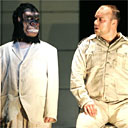
Keith Warner's production of Berg's Wozzeck closes with a boy staring at his father's corpse lying twisted in a tank of formaldehyde as if it were the human equivalent of one of Damien Hirst's sculptures. Amplified voices, meanwhile, echo round the building, as if in the child's brain. The moment has tremendous power. In being turned into an exhibit, Wozzeck is denied in death the humanity he was also denied in life. The madness that overtook him is already affecting the next generation.
Yet at the same time, something is missing. Berg wanted a children's chorus on stage during the final scene, effectively placing Wozzeck's son in a social context, and implying that the opera's catastrophe is far from isolated. That Warner leaves the children offstage points to the flaw in his approach. Berg argues that the ills of mankind are societal as well as psychological: Wozzeck is destroyed not only because he is a proletarian visionary in an uncomprehending petit bourgeois society, but also because he is poor. Warner, however, presents us primarily with a study in psychopathology. Wozzeck's drama plays itself out in a morgue, where the trappings of his already dissected life are preserved in tanks and vessels, and where the world that abused him is reduced to nightmare images in his own brain. It's never less than forceful, though in dropping the social context, Warner is also only telling half the story.
Yet for all that, you need to see it. Johan Reuter is tremendous and uncompromising in the title role, pulling us with him to the outer limits of the human psyche. Susan Bullock, in her long overdue Covent Garden debut, is his slatternly yet sympathetic Marie. Some of the rage missing in Warner's staging, meanwhile, seethes through Daniel Harding's conducting. A gravely flawed evening, though often a remarkable one.
· In rep until March 13. Box office: 020-7304 4000.

